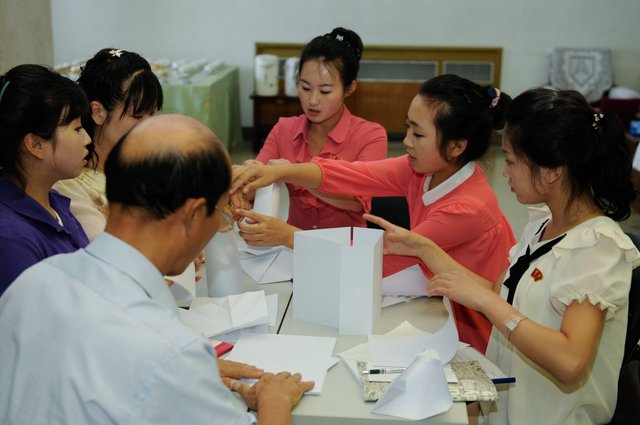How Blockchain Saved My Work in North Korea
 Choson Exchange's Women in Business Workshop in North Korea
Choson Exchange's Women in Business Workshop in North Korea
I started watching the blockchain space in 2012. It was a chance meeting in New York City where I met Lucas, an in-house philosopher at Google. I was meeting him for Choson Exchange, which I founded in 2009 to train female entrepreneurs in North Korea. In a currency reform in North Korea in 2009, many Korean entrepreneurs saw their wealth confiscated when the Korean government capped the amount people could convert into a new currency. This made me interested in censorship-proof systems for private exchange that entrepreneurs could use. Lucas told me to look into Bitcoin. I read Satoshi Nakamoto’s White Paper and was fascinated by its implications.
But unfortunately, I was committed to building our programs in North Korea and later co-founded another business in Vietnam. But I continued watching the blockchain space. Then in 2016, North Korea’s rapid nuclear and missile technology advances sparked panic in Washington DC and Seoul. The state apparatus on both sides became more hostile towards non-governmental organizations operating in North Korea. This reached a fever pitch in early 2017 when President Trump was elected and South Korea’s President Park faced impeachment charges. In Seoul, desperate to prove that her North Korea policies were working, President Park unleashed the National Intelligence Services (a domestic and foreign intelligence service) on many NGOs operating in North Korea. They led a systematic harassment campaign towards me and people like us when we did not support their objectives. Donors fled.
Some in Washington DC who hated our message that North Korea could be reformed. They attempted to censor us by lobbying the Treasury to sanction our work. While they did not succeed, tightening sanctions led to many banks abandoning customers doing anything related to North Korea - especially since the small amounts of money our business brought was insignificant when compared to the risks they faced. I was already maintaining our programs on a shoestring, and the final straw came when Bank of America decided to close our NGO’s account and return our money - with a catch. They could only transfer the money to another US bank. We had done nothing wrong. But the bank just did not want the risk of handling our money. At this time, no US bank wanted to touch anything related to humanitarian work in North Korea. All our cash had effectively been seized by a bank. I flew to the US and went from branch to branch and spent hours on the phone pleading with a bureaucracy seemingly designed to insulate management from their customers. Their hotline kicked me over to the branches, and the branches said only the hotline could solve my problems. This cycle went on for weeks. No one had any authority or responsibility. They empathized but everyone was powerless in Kafka’s bureaucracy.
Meanwhile, a marginal issue of Women in Business in North Korea kept getting more marginalized and funding was at an all time low. Fed up with a banking bureaucracy that could seize our assets without any accountability and faced with the prospect of losing everything, I turned back to the blockchain for salvation. I transferred assets to the blockchain and used it to protect my work against an arbitrary and censored financial system. The timing in 2017 was fortuitous. This was a turning point for me. I realized the freedom centralization has taken away from us. In building Choson Exchange, a decentralized worldwide team with over 100 dedicated volunteers, I also saw what a small group of motivated evangelists can do to create change. I decided to join the blockchain revolution.
Blockchain saved me and I had to pay back the debt. This led me to the next stage of my journey, joining a blockchain startup in Singapore. In my next phase, I want to be able to answer three questions in Asia:
- How do we generate business value from blockchain use cases?
- How do we build operations around blockchain-based business models?
- How do we get industry ecosystems to adopt blockchains?
Thank you Bitcoin! Thank you Satoshi-san!
Congratulations @geoffreysee! You have completed some achievement on Steemit and have been rewarded with new badge(s) :
Click on the badge to view your Board of Honor.
If you no longer want to receive notifications, reply to this comment with the word
STOP